Can Dogs Eat Apples? Fruit is a healthy and delicious treat for dogs, but not all fruits are safe for canine consumption. Apples, however, are a great option! They are packed with vitamins and fiber and can be a tasty addition to your dog’s diet.
According to veterinarians, dogs can safely eat apples in moderation as a healthy treat. Apples are a good source of vitamins A, and C, and fiber, and they also contain antioxidants. It is important to remove the core and seeds before feeding apples to dogs, as the seeds contain small amounts of cyanide.
Apples can be given to puppies as a training treat but caution should be taken with introducing any new foods to avoid upset stomachs. It is recommended to wash and peel apples to remove any pesticides and to cut them into small pieces to minimize the risk of choking. Dogs should be given a few pieces of apples per day as treats, making up no more than 10% of their total daily calorie intake.
Key Takeaways
- Dogs can safely eat apples in moderation as a healthy treat.
- Remove the core and seeds before feeding apples to dogs.
- Wash and peel apples to remove any pesticides and cut them into small pieces to minimize the risk of choking.
- Dogs should be given a few pieces of apples per day as treats, making up no more than 10% of their total daily calorie intake.
- Other fruits that are safe for dogs to eat include bananas, blueberries, cantaloupe, and more. Always consult with a veterinarian before introducing any new foods to your dog’s diet.
The Nutritional Benefits of Apples for Dogs

Apples are a good source of Vitamins A and C, and fiber, and they also contain antioxidants, making them a healthy treat for dogs. Vitamin A helps to maintain healthy skin and coat, while Vitamin C supports the immune system. The fiber in apples promotes good digestion and can help to regulate bowel movements. Antioxidants in apples help to fight against free radicals and reduce the risk of chronic diseases.
However, it is important to note that apples should only be given to dogs in moderation. While they are a healthy snack, they should not be a substitute for a balanced diet. Additionally, pet owners should be aware of the potential dangers of apple seeds, which contain small amounts of cyanide. To avoid any potential harm, be sure to remove the core and seeds before feeding apples to dogs.
Potential Dangers of Apples for Dogs

It is important to remove the core and seeds before feeding apples to dogs, as the seeds contain small amounts of cyanide. While a few seeds are unlikely to cause harm to a dog’s health, consuming large quantities can lead to cyanide poisoning, which can be fatal. Therefore, it is vital to remove the core and seeds from apples before giving them to your furry friend.
Cyanide poisoning can cause symptoms such as vomiting, diarrhea, difficulty breathing, and seizures. If you suspect that your dog has ingested apple seeds or core, contact your veterinarian immediately.
Additionally, dogs with sensitive stomachs may experience digestive issues if they consume too much apple. Consequently, it is recommended to introduce apples to a dog’s diet gradually and monitor their reaction before feeding them more.
Although apples are a healthy treat for dogs, proper preparation and controlled portions are necessary to keep them safe and healthy.
Feeding Apples to Puppies

Apples can be given to puppies as a training treat, but it is important to introduce any new food to their diet with caution. Puppies have sensitive stomachs, and sudden changes in their diet can lead to digestive upset and diarrhea.
When introducing apples to puppies, it is recommended to start with small pieces to assess their tolerance. After a few days, gradually increase the serving size if there are no signs of digestive issues.
In general, puppies should not consume more than 10% of their total daily calorie intake in treats, including apples. It is always best to consult with a veterinarian before introducing any new foods to a puppy’s diet.
Proper Preparation of Apples for Dogs
It is recommended to wash and peel apples to remove any pesticides before feeding them to your dog. Pesticides can be harmful to dogs, so it’s best to take extra care when preparing their snacks. Additionally, cutting the apple into small, bite-sized pieces can help minimize the risk of choking.
While the flesh of the apple is safe for dogs, it is important to remove the core and seeds before feeding them to your furry friend. Apple seeds contain small amounts of cyanide, which can be harmful to dogs if consumed in large amounts. Cyanide can also be found in other fruits, such as cherries and apricots, so it’s important to be aware of this potential danger.
When introducing apples to puppies, it’s important to do so in moderation and with caution. Puppies have delicate stomachs and can easily become sick from eating too much of any new food. As with any new food, it’s best to start with a small amount and monitor your puppy for any signs of stomach upset.
Appropriate Serving Size for Dogs
Dogs should be given a few pieces of apples per day as treats, making up no more than 10% of their total daily calorie intake. It’s important to monitor the amount of treats your dog receives to prevent weight gain and potential health issues.
Treats should be given in moderation and should never be used as a substitute for a balanced diet. Before introducing any new foods to your dog’s diet, it’s important to consult with a veterinarian to ensure that your pet’s nutritional needs are being met.
One medium-sized apple contains approximately 95 calories. If your dog consumes too many apple slices, it could lead to an upset stomach, diarrhea, or vomiting. When feeding your dog apples, ensure that the apple slices are cut into small pieces to minimize the risk of choking.
Other Safe Fruits for Dogs
Other fruits that are safe for dogs to eat include bananas, blueberries, cantaloupe, cranberries, cucumbers, mangos, oranges, peaches, pears, plums, pineapple, pumpkin, raspberries, strawberries, and watermelon. These fruits offer a variety of vitamins, antioxidants, and fiber that can benefit your dog’s overall health.
Bananas are an excellent source of potassium, which can contribute to heart health. Blueberries are rich in antioxidants that can help prevent cell damage and promote healthy aging. Oranges are high in vitamin C, which can boost the immune system. Watermelon is a great source of hydration during hot summer months and is also a source of vitamins A and C.
Remember, it is important to introduce new foods to your dog’s diet slowly and in small amounts to avoid any upset stomach. Consult with a veterinarian to determine what fruits are safe for your dog to eat, especially if your dog has any underlying health conditions or dietary restrictions.
Final Thoughts
In conclusion, dogs can safely eat apples in moderation as a healthy treat. Apples contain vitamins A and C, fiber, and antioxidants that can be beneficial for a dog’s health.
However, it is important to remove the core and seeds before feeding apples to dogs because these contain small amounts of cyanide that can be harmful to them.
To ensure a dog’s safety, it is also recommended to wash and peel apples to remove any pesticides and to cut them into small pieces to minimize the risk of choking.
When feeding apples to puppies, it is essential to introduce new foods slowly and with caution. Dogs should be given a few pieces of apples per day as treats, making up no more than 10% of their total daily calorie intake.
Other fruits that are safe for dogs to eat include bananas, blueberries, cantaloupe, cranberries, cucumbers, mangos, oranges, peaches, pears, plums, pineapple, pumpkin, raspberries, strawberries, and watermelon.
As always, it is crucial to consult with a veterinarian before introducing any new foods to a dog’s diet, as certain fruits and vegetables may not be suitable for all dogs.
FAQs
A: Yes, dogs can safely eat apples in moderation as a healthy treat.
A: Apples are a good source of vitamins A, C, and fiber, and they also contain antioxidants.
A: Yes, it is important to remove the core and seeds before feeding apples to dogs, as the seeds contain small amounts of cyanide.
A: Yes, apples can be given to puppies as a training treat, but caution should be taken with introducing any new foods to avoid upset stomachs.
A: Apples should be washed and peeled to remove any pesticides, and cut into small pieces to minimize the risk of choking.
A: Dogs should be given a few pieces of apples per day as treats, making up no more than 10% of their total daily calorie intake.
A: Yes, other safe fruits for dogs include bananas, blueberries, cantaloupe, cranberries, cucumbers, mangoes, oranges, peaches, pears, plums, pineapple, pumpkin, raspberries, strawberries, and watermelon.
Read More:
- Can Dogs Eat Pineapple? Healthy Snack Guide for Pups
- Can Dogs Eat Tomatoes? – The Truth Unleashed for Pet Parents

